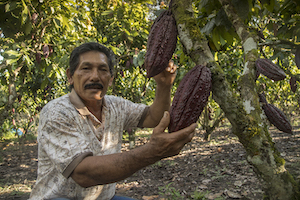With science as the bridge, EII connects the worlds of public policy and rural development in tropical forest regions. From technical support to jurisdictions striving for low-emission sustainable growth, to hands-on guidance for smallholders, and innovative strategies that help companies committed to reducing tropical deforestation ensure their goals are met, EII fosters the kinds of collaboration needed to achieve forest-, community-, and climate-friendly rural development in the tropics. A few of our more recent successes include:
California Tropical Forest Standard (CATFS)
EII supported the development and recent approval of the CATFS by the California Air Resources Board. We are now supporting front-running jurisdictions (Acre, Mato Grosso) to become verified under this and other carbon offset schemes.
Acre, Brazil’s Incentive System for Ecosystem Services (SISA)
EII’s Country Coordinator for Brazil, Monica de los Rios worked with the Acre government to develop this groundbreaking new program in 2009. SISA has since become perhaps the world’s best example of a socially inclusive approach to state-wide forest conservation and is heralded among conservationists as a model for other states.
Colombia’s Amazon Vision Program
EII contributed to the design of this ambitious strategy aiming to achieve zero net deforestation and foster new economic opportunities for smallholder farmers and rural communities.
Matto Grosso’s ‘Produce, Conserve, and Include’ Program
With EII supporting development, the PCI strategy aims to help Brazil’s largest agricultural region increase soy and beef production while achieving state-wide reductions in deforestation.
The “Guiding Principles for Collaboration & Partnership between Subnational Governments, Indigenous Peoples, and Local Communities”
EII co-coordinated a process with the Governors’ Climate and Forests (GCF) Task Force Secretariat that culminated in the historic “Guiding Principles,” endorsed by 37 GCF governors, to help protect the rights of forest guardians, support their livelihoods, and guarantee their participation in decision-making.
Establishment of the Sustainable Tropics Alliance
EII led the establishment of the Sustainable Tropics Alliance (STA), a collaboration among some of the world’s leading NGOs in tropical forest regions to improve their ability to advance sustainable, low-emission rural development.
Jurisdictional RSPO Certification
EII worked with district governments in Indonesia—Kotawaringin Barat and Seruyan—resulting in a formal agreement to move their palm oil sectors towards jurisdiction-wide sustainability, with official support from the Roundtable on Sustainable Palm Oil (RSPO).
Applied Science: At EII, we believe that rigorously established evidence and broad dissemination of information is the basis for good policy-making and progressive social change. Our Science program focuses on designing and conducting research and analysis driven by the environmental and socioeconomic challenges tropical nations face. Together with our partners, we:
- Conducted the viability assessment and design for the German/UK results-based-payment contract with Mato Grosso, which shaped Brazil’s nationally determined contribution submission prior to the Paris Climate Summit
- Assessed Ecuador’s REDD+ Action Plan, with several recommendations adopted by the Ecuadorian government
- Published an assessment of the contributions of public policy measures and supply chain strategies to Brazil’s historic decline in Amazon deforestation that identified important course corrections
- Led the most extensive global assessment ever made of tropical jurisdictions’ progress towards forest-friendly development, in collaboration with CIFOR and the GCFTF Secretariat. The “State of Jurisdictional Sustainability: Synthesis for Practitioners and Policymakers” analyzed 39 tropical forest jurisdictions, allowing us to uncover important lessons for improving the effectiveness of climate finance, the critical lack of corporate-jurisdiction partnerships to conserve forests, and lessons from the Rio Branco Declaration


